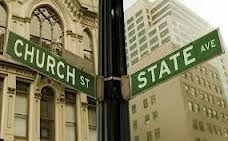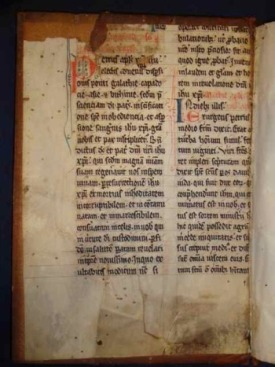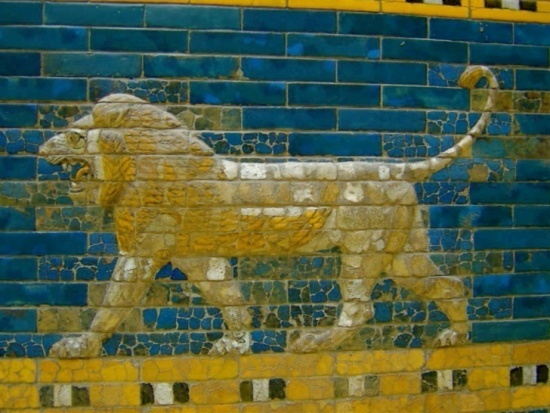Friday Night Academy Audio
 Sunday, February 7, 2016 at 04:59PM
Sunday, February 7, 2016 at 04:59PM  Here's the audio from Friday night's Academy lecture. Being a Christian Citizen in a Secular State: Is America a Judea-Christian Republic?
Here's the audio from Friday night's Academy lecture. Being a Christian Citizen in a Secular State: Is America a Judea-Christian Republic?
Living in Light of Two Ages
____________________________
 Sunday, February 7, 2016 at 04:59PM
Sunday, February 7, 2016 at 04:59PM  Here's the audio from Friday night's Academy lecture. Being a Christian Citizen in a Secular State: Is America a Judea-Christian Republic?
Here's the audio from Friday night's Academy lecture. Being a Christian Citizen in a Secular State: Is America a Judea-Christian Republic?
 Sunday, February 7, 2016 at 04:50PM
Sunday, February 7, 2016 at 04:50PM  The Story of Moses (Part 1)
The Story of Moses (Part 1)
On this program the hosts continue their series, The Story of God’s People, as we look at the great characters and moments of redemptive history. This week we will begin a two-part exploration of the life and ministry of Moses.
Who was Moses and why was he such an important figure in ancient Israel? How do the events in Moses’ life end up foreshadowing the greatest story ever told? That’s the focus of this edition of White Horse Inn.
 Tuesday, February 2, 2016 at 10:18AM
Tuesday, February 2, 2016 at 10:18AM 
The First in a Series of Sermons on 1 Peter
Presumably, most of us are US citizens–either by birth or by naturalization. American citizenship entitles us to all the benefits and privileges of living in the United States. Yet, our national citizenship also carries with it the responsibilities of being an American–we vote, we pay taxes, we may be called to serve in the miliary, etc. But in addition to our US citizenship, Christians possess another kind of citizenship. If we trust in Jesus Christ and possess the Christian passport (baptism), we are also citizens of Christ’s kingdom–we hold a dual citizenship. Just as our natural citizenship provides us with certain benefits, and places certain responsibilities upon us, so to does our citizenship in Christ’s kingdom. The purpose of Peter’s first epistle is to spell out both the privileges and responsibilities of our membership in Christ’s kingdom, even as we dwell in the midst of the civil kingdom with its many blessings, its numerous duties and obligations, and its soul-threatening dangers.
We begin a new series on three of the seven so-called “catholic epistles” or “general epistles” found in the New Testament. The three epistles we’ll be covering in this series are 1st and 2nd Peter, along with Jude. The reason why these letters (along with James and the three epistles of John) are called “catholic” or “general” epistles is because they are addressed to Christians in general, and are not addressed to specific individuals or churches as is the case with the letters of Paul. The general letters come out of the very heart of the apostolic circle: Peter–the chief apostle; James the half-brother of Jesus and the leader of the Jerusalem church as well as one the first Christian martyrs; John–the author of the gospel bearing his name, three epistles and the Book of Revelation; and Jude, another half-brother of Jesus. So, the general letters are very important if too often overlooked.
Reformed Christians often view themselves as students of Paul–because in our own history the doctrinal debates we have faced often deal with the question of how sinners are reckoned as forgiven and righteous before God (justification). Our theologians write books on Paul and especially his commentaries on Romans and Galatians–with good reason. We need to properly understand the gospel in order to share it with others, and to live in light of the countless blessings secured for us by Jesus Christ. While the battles over justification are important, and we do need to be thoroughly conversant with Paul and his letters, I suggest that American Christians must now also fight on a second front–the ever-growing challenge of secularization. The two letters of Peter and the short letter from Jude provide first century Christians with very specific instructions about how Christians are to live as exiles in a foreign land. For the original recipients of these letters, this meant the diaspora of the Greco-Roman world of the first century because the Christians receiving this letter had been forcibly removed by Roman authorities from the cities in which they had been born and raised.
While I am at home in the land of my birth and find much here of value and joy, as I get older I am also aware that the land in which I live is becoming increasingly hostile to the things I believe about the meaning and purpose of life, the values I hold dear, as well as those things I believe as a Christian as expressed in the Apostles Creed. In many ways, I feel like a foreigner in my own country–not a foreigner in the sense of race, custom, or culture, but a foreigner in light of how my neighbor sees the world, how they live their lives, what they think important, and how they make decisions about right and wrong. I simply do not believe the same things about the meaning and purpose of life which most of my neighbors do. Part of the reason is I have a dual citizenship and they do not.
To read the rest of this sermon: Click Here
 Monday, February 1, 2016 at 11:10AM
Monday, February 1, 2016 at 11:10AM  Sunday Morning, February 7: We are continuing our series on the Book of Daniel. This coming Lord's Day we will consider Nebuchadnezzar's dream and Daniel's offer to interpret (Daniel 2:1-24). Our worship service begins at 10:30 a.m.
Sunday Morning, February 7: We are continuing our series on the Book of Daniel. This coming Lord's Day we will consider Nebuchadnezzar's dream and Daniel's offer to interpret (Daniel 2:1-24). Our worship service begins at 10:30 a.m.
Sunday Afternoon: We continue our study of the Heidelberg Catechism. Our topic this week is the nature of faith from Lord's Day 7, Q & A 20-23. Our catechism service begins @ 1:15 p.m.
Wednesday Night Bible Study, February 3: We are continuing our overview of Paul's two Thessalonian letters. This week we look at echoes from the Old Testament. Our study begins at 7:30 p.m.
The Friday Night Academy: February 5: The Academy continues this week with our series "In the Land of Nod" discussing the two kingdoms. This week, we focus upon the question, "Is America a Judeo-Christian Republic?" The lecture begins at 7:30 p.m.
For more information on Christ Reformed Church you can always find us here (Christ Reformed Info), or on Facebook (Christ Reformed on Facebook).
 Sunday, January 31, 2016 at 04:52PM
Sunday, January 31, 2016 at 04:52PM 
Here's the audio from this morning's sermon: Click Here
 Sunday, January 31, 2016 at 04:38PM
Sunday, January 31, 2016 at 04:38PM  Here's the audio from Friday night's lecture, "The Church's Witness in Nod: John the Baptist, John the Apostle, and Civil Disobedience"
Here's the audio from Friday night's lecture, "The Church's Witness in Nod: John the Baptist, John the Apostle, and Civil Disobedience"
 Sunday, January 31, 2016 at 03:08PM
Sunday, January 31, 2016 at 03:08PM  The Story of Joseph
The Story of Joseph
On this program the hosts continue their series, The Story of God’s People, as they look at the great characters and moments of redemptive history. On this edition of the program the hosts are taking a look at Joseph. In Andrew Lloyd Webber’s famous musical, Joseph and the Amazing Technicolor Dream-coat, audiences around the world are presented with a parable about what we can all accomplish if we dream big dreams, since at the end of the day, “Any Dream Will Do.”
So is this the best way to read the story of Joseph? Is he just a model for us to emulate if we dream big dreams? What if the story is not about us at all, but rather is about God and his plan of redemption? That’s the focus of this edition of the White Horse Inn as the hosts continue their series, The Story of God’s People.
 Thursday, January 28, 2016 at 02:09PM
Thursday, January 28, 2016 at 02:09PM  Ben Sasse continues to raise an important question regarding the continual increase of the power of the executive branch of government. Sasse calls out Donald Trump and those in both parties who champion presidential unilateralism.
Ben Sasse continues to raise an important question regarding the continual increase of the power of the executive branch of government. Sasse calls out Donald Trump and those in both parties who champion presidential unilateralism.
 Wednesday, January 27, 2016 at 11:37AM
Wednesday, January 27, 2016 at 11:37AM 
Christ Reformed Church's website has been upgraded (using Squarespace V7). Check it out here: Christ Reformed Church
There will be a few bugs and broken links for a while, but we'll get these worked out.
Hopefully, there will be a revised Riddleblog down the road--this blog is long overdue for a makeover (as is its owner).
 Tuesday, January 26, 2016 at 09:57AM
Tuesday, January 26, 2016 at 09:57AM 
The Sixty-Fourth and Final in a Series of Sermons on the Gospel of John
Jesus has but a few final words for his disciples before he ascends into heaven. That night on which they celebrated the Passover together now seems so long time ago in light of all of the things which have happened since. Jesus has since been arrested, tried, crucified, rose again from the dead, and then appeared to his disciples three times–twice in Jerusalem, and once in Galilee. The fundamental character of redemptive history has changed. Jesus will reinstate Peter as chief apostle, and prepare the others for a new phase of redemptive history, when Jesus pours out his Holy Spirit upon them on the Day of Pentecost. Jesus’ disciples will go and preach the gospel to the ends of the earth, and in doing so, will turn the whole world upside down.
We have finally come to the end of our series on the Gospel of John. Sixty-four sermons, twenty one chapters, eight-hundred and seventy-nine verses. This is truly an amazing document–especially in comparison to the synoptic gospels (Matthew, Mark, Luke). John’s Gospel has many affinities with the other gospels, yet at the same time John has a completely different organizational structure and unique points of emphasis. Hopefully, John’s Gospel will remain familiar to us as we move on to new biblical texts in the weeks to come. Now that we know John’s Gospel a bit better, it is my hope that we all turn to it often and read through it regularly. This gospel is too important to neglect.
As I pointed out last time when we began going through the epilogue of John (the 21st chapter), critical scholars tend to argue that this chapter is an appendage–not an integral part of the gospel, and tagged on to the end by either John, or someone else. As we saw, however, these verses make an important point and are not carelessly stuck on to the end of John’s summary statement in 20:30-31 as critical scholars believe. Recall that in his summary statement, John writes, “now Jesus did many other signs in the presence of the disciples, which are not written in this book; but these are written so that you may believe that Jesus is the Christ, the Son of God, and that by believing you may have life in his name.” This is both a summary statement of the content of his gospel, as well as a challenge to all who read and hear the gospel to believe in Jesus Christ.
In context, John’s point about believing in Jesus and then possessing life in his name is tied to the blessing which Jesus extends to the doubting Thomas, as well as to those, who, unlike Thomas, believe in Jesus based upon the testimony of those who did see Jesus’ miracles and heard him preach. John says “blessed are those who have not seen and yet have believed.” In addition to defining the promised blessings, John’s summary statement also wraps-up his account Jesus’ post-resurrection appearances in Jerusalem. Yet several important things do occur after the risen Jesus appears to his disciples in a locked room in Jerusalem eight days after Easter. These things are recounted in John 21.
In chapter twenty-one the scene shifts from Jerusalem to the Galilee region at some point in the days and weeks after Jesus appeared to his disciples on two different occasions in Jerusalem. After this, the disciples (at least those mentioned here by John) returned to their home towns and their previous vocation–fishing. Although Jesus told them that he would go ahead of them to the Galilee, they did not recognize Jesus when he began speaking to them from the shore. Given the difficulties of grasping the new realities of redemptive-history after Jesus was raised from the dead, the disciples do not expect that Jesus was the one speaking to them from the water’s edge as they struggled to get their boat ashore.
To read the rest of this sermon: Click Here